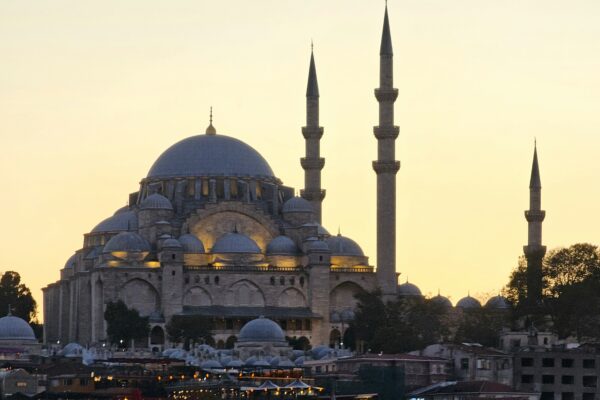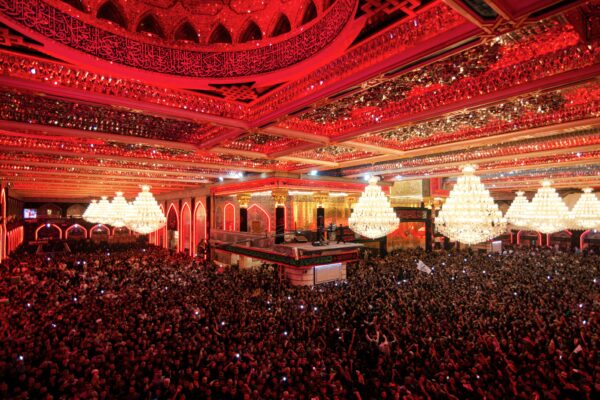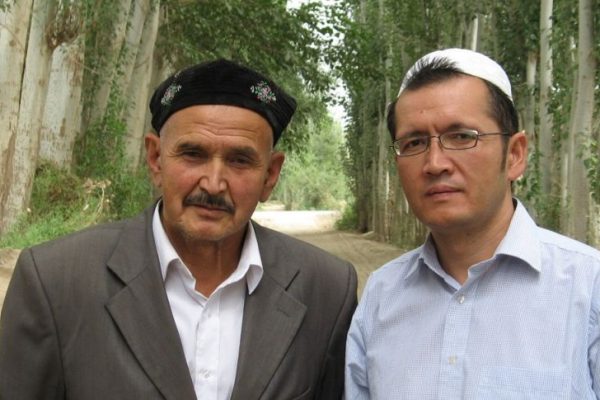A picture can offer a thousand words but a symbol can offer a thousand meanings. The symbol of Mecca would be the white mass circumambulating around the Kabah within Masjid al-Haram; a picture painting a thousand words about over a thousand pilgrims. It shows equality and a family not tied by blood…But overlooking the mosque almost never in the pictures are the looming skyscraper hotels and buildings that have become a symbol of the corrosive influence capitalism is having in countries like Saudi Arabia.
These workers are the ghost inhabitants of these countries; they are there yet not really there, seen everywhere in society but airbrushed into invisibility by the same society.
Materialism within the Muslim world outweighs morality. Within the Middle-East, as there has been an explosion of wealth born from oil, inequality has soared. Life for the ruling elites has prospered enormously while stagnating considerably for the rest. At the heart of the inequality is the brutal exploitation of workers, mostly migrants; they have been stripped of their dignity and security and this has facilitated the construction of skyscraper cities that have become a capitalist utopia but a spiritual nightmare.
Countries such as Qatar, Dubai and Saudi Arabia have awful records in their treatments of their migrant workforce. These workers are the ghost inhabitants of these countries; they are there yet not really there, seen everywhere in society but airbrushed into invisibility by the same society. These workers are often the road cleaners, toilet cleaners, the servants or the people staffing the shop floors. They are utterly relevant and pivotal to the basic functioning of those societies and yet ruthlessly disregarded at the same time. When the world speaks of the appalling human rights records of the Middle-Eastern countries, it is right that their treatment of non-Muslims, women and political dissenters comes into mind yet what is absolutely vital is their treatment of their foreign workers.
At the moment the workers in the Middle-East are essentially being held hostage by their employers, utterly powerless. Within the region there is the existence of the Kafala system that means an employee cannot leave without the employer’s permission. This has imbued workplace bosses with incredible power over a discriminated workforce drawn largely from various ethnic minorities.
Many workers, toiling in sun-baked desert conditions, are deprived of water breaks and face extreme hunger, dehydration, illness and eventually the threat of death.
No-one embodies this worse than Qatar. The country, with little world history never mind football, is preparing to host the World Cup in 2022; this is something that will utterly transform the country financially and politically. Qatar has already laid out its blueprint of the future, with some amazingly creative ideas for a World Cup that no-one is too happy about. Qatar is not Brazil. But beyond the grumblings about football losing its soul to corporate interests, Qatar’s successful World Cup bid has exposed its hidden treatment of its migrant workforce, drawn largely from Asian countries like Nepal and India.
The Guardian revealed that in the summer of 2014, at least 44 Nepalese workers had died. It was even worse in 2013: around 185 of Nepalese workers had died. Hundreds more of Indian and other Nepalese workers had also died. Qatari officials first denied the accusations and then acknowledged them, accepting a need for a labour reform. Many of these workers come in need of income and therefore are trapped, whether through the kafala system or not, in a cycle of exploitation and misery. Their shelter conditions are often terrible, cheap accommodation not prepared with any investment in care or decency. Many workers, toiling in sun-baked desert conditions, are deprived of water breaks and face extreme hunger, dehydration, illness and eventually the threat of death.
It is a similar oppression that greets workers in Saudi Arabia, where often migrant workers if they are female face heavy violent and sexual abuse from their employers. Saudi Arabia like its Gulf neighbours heavily relies on a foreign workforce to supply the labour that creates their lucrative wealth. But for these workers, rewards are thin and punishments are high. It has a downward effect on the Saudi society too, which has become increasingly unequal. In a country of 28 million, between 2 to 4 million live below the poverty line. Protests have not achieved results; Saudi Arabia snuffs out dissent like a candle in the wind.
The issue comes with Middle-East not remedying its kafala system, allowing the employers to effectively turn the workers’ labour occupations into a prison that occupies their lives permanently. Many Qatari employers had confiscated the passports of workers who wanted to leave, delaying their payment of salaries often for months. Workers robbed off salaries and passports could not leave or survive, even as many sought refuge in the Nepalese embassy. In the wake of the recent atrocious Nepalese earthquake, many workers were denied the right to leave for funerals in their homeland.
At the moment, the symbol of a country like Saudi Arabia isn’t the Holy Mosque but rather those migrant, sweaty workers in their blue uniforms, scrubbing and cleaning dirt that is etched in the essence of these countries now
Western governments must honestly reassess their relationships with the various dictatorships of the Middle-East. The huge pull of oil has led to the death of possibly millions of faceless, unnamed souls over the past few decades. Middle-East has become a region soaked not only in wealth but exploitation; that has been facilitated by the huge interest placed in this region by external forces. Perhaps this is a good time to take climate change seriously and invest in renewable energies. Certainly by effectively sponsoring the tyrannical policies of these regimes, we encourage their brutal behaviour.
The second change that is badly needed is the presence of trade unions with strong voices. They are pillars of democracy, creating and entrenching workplace rights. Their presence is badly needed within the Middle-East, perhaps to act in a political capacity that stretches beyond labour rights and can be argued over human rights and civil liberty issues too.
At the moment, the symbol of a country like Saudi Arabia isn’t the Holy Mosque but rather those migrant, sweaty workers in their blue uniforms, scrubbing and cleaning dirt that is etched in the essence of these countries now. It is important that the true picture of countries like Saudi Arabia and Qatar is exposed. Pictures of the Holy Mosques or massive skyscraper hotels are the pictures they want us to see; pictures that tell a thousand stories of each suffering worker and exposed the thousands of lies made by the Middle-East.
by Rabbil Sikdar





